LeSean Thomas Schools New York on 'Consumer' Fans and Uplifting Animators
by Reuben Baron,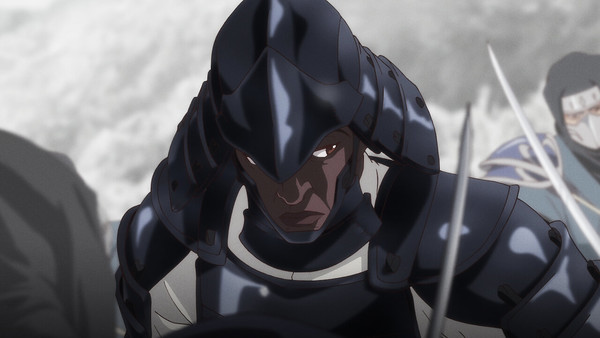
Last week, the Japan Society in New York City hosted the film series "Foreign Exchange: Anime Inspirations & Visionaries with LeSean Thomas.” Thomas, the first Black American to work as an anime director in Japan, participated in three talks hosted by Coach Mike of The Imagination Project—one for the general public, one for high schoolers, and one for college students—in addition to introducing screenings of five anime classics that influenced him (Ninja Scroll, Sword of the Stranger, Redline, Cowboy Bebop: The Movie, and Demon City Shinjuku). The Japan Society displayed artwork from Thomas' Netflix miniseries Yasuke and sold an exclusive Foreign Exchange art book as well.
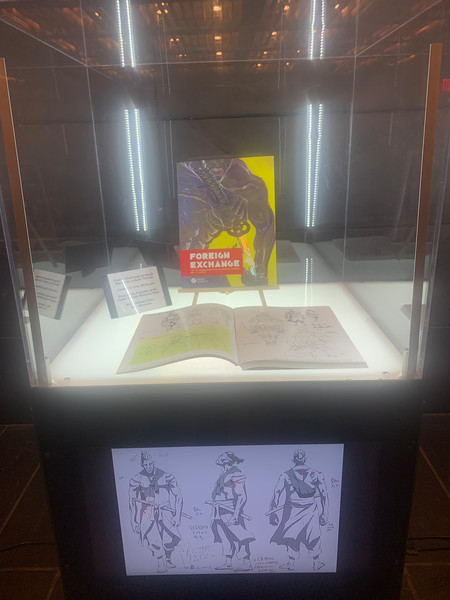
The high school talk, which followed a screening of the short film Children of Ether, gave a general overview of the arc of Thomas' life and career. Born in the Bronx in 1975 (though he still “dresses like a 12-year-old”), he first got into drawing through his older brother. He didn't do well in school and could be “mischievous,” but his love of drawing kept him off the streets—and his mother encouraged his passion by enrolling him in a junior enrichment art high school.
Thomas wanted to get into comics—he and his friends would finish each other's comics in class—but Marvel and DC were extremely competitive to get into in the '90s. Out of school, Thomas got his first major job doing an unpaid internship at Pyramid, a licensing company that made children's handbags for projects like Disney's Hercules. His comics portfolio helped him get the job because he was the one illustrator in a company mostly filled with graphic designers.
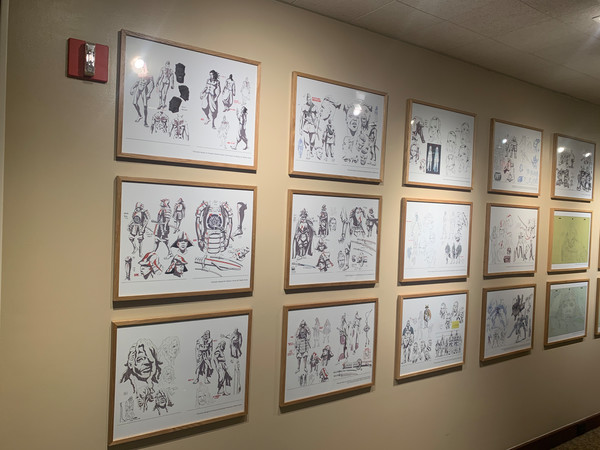
Animation work in New York dried up with the dot-com crash, so Thomas moved to Greensboro, South Carolina, where he met Carl Jones. Jones was a friend of Aaron McGruder, who was having trouble finding Black storyboard artists doing anime-style action for The Boondocks (the best action storyboarders in America at the time, Thomas says, were mostly white guys from CalArts doing Batman cartoons for WB). When Thomas joined the production of The Boondocks, he initially wanted just to be a character designer, but McGruder specifically requested his help for storyboarding the “N**** Moment” sequence.
Working in American animation, Thomas was disheartened by how little care was given to the South Korean vendor studios, saying, “I was really bothered by the fact that nobody knew who animated what.” When he decided to move to Korea to see the process firsthand on The Legend of Korra, people called him “crazy” due to the lower pay, but Thomas says, “I didn't like LA anyway.” This was not a “normal” career path, but working with the South Korean artists at Studio Mir got him in contact with Japanese studios, ultimately leading to his anime career. When asked how he stays focused as a director, Thomas answered, “Fear is a part of innovation… I just do it scared. I'm shook, but I still gotta do this thing.”
Going into the public talk, which focused on the production of Yasuke, I was told by a Japan Society staff member that this one was gonna “make people angry.” I assume this was about Thomas' responses to fan criticisms. When Coach Mike asked about the decision to throw mecha and other wild fantasy elements into a historical drama like Yasuke, Thomas noted, “I'm not on social media because I like my blood pressure low.” Still, he has seen some online reactions from certain people (“experts but only of the shit that they like”) criticizing these elements. His defense of adding mecha to a samurai story? “Why not?”
Thomas describes Yasuke as an “audacity project,” saying, “Nobody's seen anything like this before, and they're already telling me how to make it.” The production had three history advisors mainly so the director could say, “Fuck all that.” While the show isn't historically accurate, it has helped draw attention to real history (some of the staff weren't even aware Yasuke was a real historical figure before production began). Of his critics, he clarifies, “I don't hate on them; these fans are passionate,” but says that they're looking at things from a “consumer” perspective rather than a creative one. When someone says they wish Yasuke was more like Samurai Champloo or Vinland Saga, he responds, “Why do you want the same shit?” Stuff being the 'same shit' only distinguished by having Black characters is a thing Thomas criticizes about other projects—one of his hottest takes expressed in the panel is his claim that Jordan Peele's films, while high quality, are “retreads.” (On the topic of Get Out, Thomas says, “[Peele] took an '80s B-horror movie and put a well-to-do Black dude in there but kept everyone else white”).
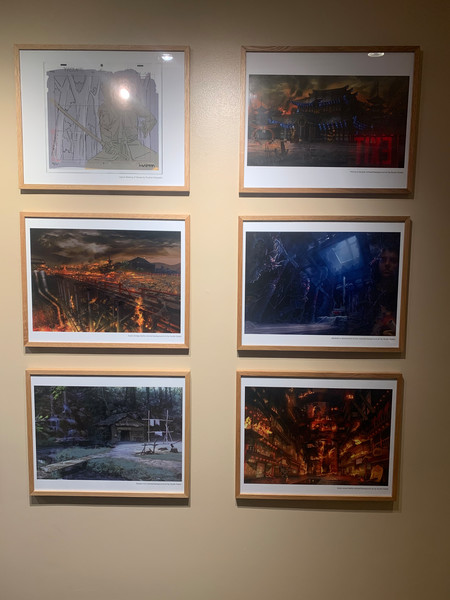
Ultimately, his response to criticism of Yasuke from other Black anime fans is to encourage them to create their own shows. “Everyone has their own ideas of what the first Black anime should look like,” and Thomas wants to see more and eliminate the “scarcity mindset” surrounding representation. He particularly longs to see more adult-oriented Black animated dramas—the last American example he could remember before pitching Yasuke in 2017 was the HBO Spawn show. The Boondocks was groundbreaking in the adult comedy field—he remembers the response to the show being a mix of “This is amazing!” and “This needs to be canceled!”—but mining socioeconomic struggles for dark satire in shows like The Boondocks and Black Dynamite eventually exhausted Thomas, who has since leaned into more fantastic escapism.
Thomas celebrates that Netflix “opened the door” for his Black genre shows, and has pushed for more global, democratized IP than the legacy studios—“We never would have got Squid Game from Hollywood.” Of course, Netflix's reputation in recent years has gone from boundary pusher to serial canceller—a shift he acknowledged in his industry-focused college talk, though he believes Netflix is starting to recover from its post-COVID contraction and revealed he has a new project in the works for the streamer.
The college talk opened with a screening of the first episode of Cannon Busters—and much of the event focused on the struggles of getting that sci-fi series off the ground. Netflix became interested in the project after seeing the Children of Ether short, but because Thomas wanted to keep the IP rights, Netflix wouldn't finance it. A UK bond completion company and the Taiwanese company Nada Holdings (Netflix wasn't available in Taiwan yet) took on much of the financing burden.
This production was “a little rocky” because of this. Japanese studios are used to being funded by production committees, so working with a completion bond company was new for them. Artists had to get physicals for insurance purposes. Nada Holdings' CEO was friends with the president of the Chinese streaming service BilliBilli, and questions about Chinese censorship standards were a big issue. At the time, the Chinese government had taken a stance against hip-hop in general due to certain artists using the genre as a means of protest, which posed an issue with Cannon Busters' opening theme.
Thomas does not speak Japanese, so he used an interpreter throughout the production. He made friends with the animators, which meant going out for drinks with them regularly; “I'm not a drinker,” he says, “but they don't smoke weed in Japan.” One big cultural difference he noted is that “there aren't a lot of ‘cowboys’ in Japanese productions compared to the United States, where you can have an intern trying to rewrite the script.” Japanese animators are more likely to say, “Tell me what you need”—by which they mean, “Tell me how to do it right.”
With Cannon Busters, Thomas wanted to “play around” with the many different ways Black characters (or more precisely, Black-coded characters, since no one in the show is from Earth) can look in anime. S.A.M. is pure moé style, while Philly the Kid looks like he could have stepped out of Cowboy Bebop. Thomas sometimes had to teach the Japanese animators how to draw Black people; when one design for the second episode came back with “sausage lips,” he sent an email explaining the history of minstrel imagery and why it could be offensive to international audiences.
Another challenge came about when it was time to dub Cannon Busters in English. The producers had only budgeted for a non-union dub, not considering that most of the best Black voice actors are union and that non-union dubs tend to be overwhelming white. A whitewashed Cannon Busters cast would be unacceptable, so they ended up spending an additional $8,000 per episode on a union dub from NYAV Post (Thomas' preferred dubbing studio, which is “excellent” at finding diverse voice talent).
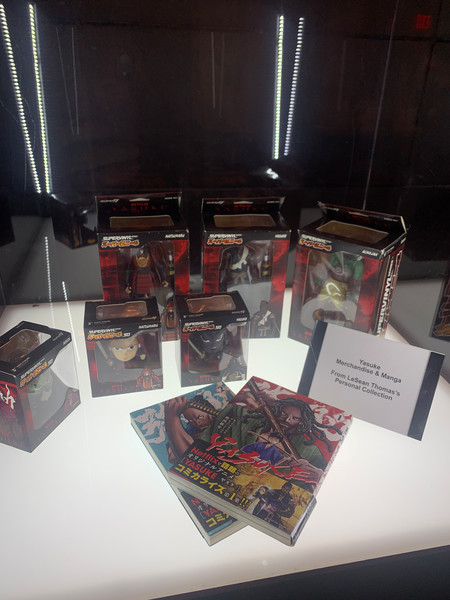
Thomas wanted to impart a few major messages to the students attending. He wanted them to realize “you can be more than a fan” and that they could create their own anime. He also emphasized the importance of learning who makes the anime you love (joking about people who love Hunter x Hunter but “don't know who the fuck made Hunter x Hunter”), and to recognize and uplift the artists who inspire you. In his closing words, he told the crowd, “I would like to see us uplift each other more”—the industry's competitiveness can make young artists shy about praising each other, but a rising tide lifts all boats.
discuss this in the forum (33 posts) |